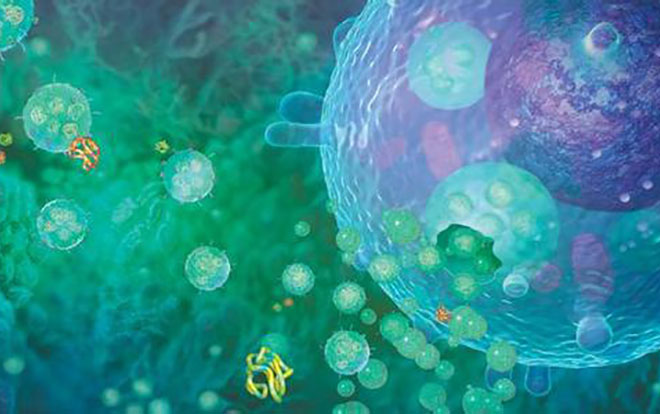Professor Raghu Kalluri of the Anderson Cancer Center, which was interviewed by Bio-Exploration, has made new research progress: the genetic manipulation of exosomes may provide a new treatment for pancreatic cancer. Related articles were published online in Nature on June 7.
Professor Raghu Kalluri's previous research determined that exosomes can be used to diagnose pancreatic cancer, but these latest findings are to allow genetically engineered exosomes to acquire new functions—direct and specific targeting of the mutant KRAS gene. Genes are usually associated with pancreatic cancer.
Modified exosomes can deliver RNAi
In this study, exosomes normally produced by cells and present in the blood were modified to "iExosomes", which were able to deliver small RNAs to specifically targeted mutant KRAS genes, leading to disease suppression and in mouse models. The overall survival rate has increased. When delivering through these natural nanoparticles, exosomes, the researchers used a targeting approach called RNA interference (RNAi). Studies have shown that exosomes can serve as an effective vector for RNAi and enter various cells including cancer cells.

When a mutation occurs, the KRAS gene acts as a molecular switch and is trapped in the "on" position. It is the most common mutation in 80 to 95 percent of pancreatic ductal adenocarcinoma (PDAC). Studies have shown that iExosomes can provide KRAS gene-specific targeting substances called siRNA and shRNA, which are more efficient than their synthetic analog, iLiposomes, and have natural complexity and advantages.
CD47 avoids its engulfment by immune cells
This study not only shows that exosomes have superior ability to deliver siRNA molecules and inhibit the growth of invasive pancreatic tumors compared to liposomes. Studies have also shown that the presence of CD47 on exosomes can avoid phagocytosis by circulating monocytes.
CD47 is a protein involved in many cellular processes, including cell death, growth, and migration. Phagocytosis is the process by which leukocytes, called macrophages, digest cell debris, foreign bodies and particles. Monocytes are the largest of the white blood cells important to the immune system. CD47 is mainly responsible for initiating the "Don't Eat Me" signal to inhibit phagocytosis. The researchers determined how CD47 can help eliminate exosomes in the circulatory system and enhance delivery to pancreatic cancer cells.
According to current treatment standards, the prognosis of patients with PDAC is poor, and effective new treatments are necessary. Genetic analysis of PDACs suggests that KRAS mutations are present in most patients and play an important role in the initiation, progression and metastasis of cancer. There are other genetic defects in the inhibition of tumor progression by genetically inhibiting the oncogene KRAS. Directly and specifically targeting KRAS has been difficult to achieve before this study.
Personal Protection Kit ,Reusable Face Mask,Anti-Dust Face Mask,Protection Mask
Zhejiang Lanhine Medical Products Ltd. , https://www.lanheyiliao.com